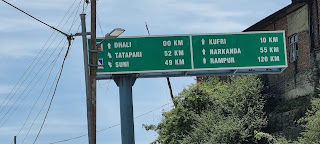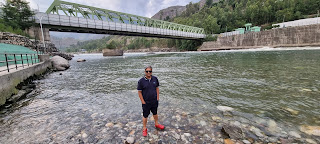Spiti Trip 3-12 June 2023 (7N8D)
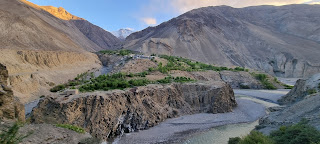
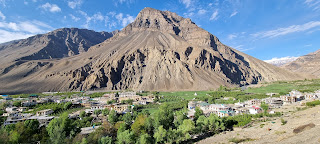

For a long time, I longed for visiting Lahaul Spiti region of Himachal Pradesh as I had heard a lot about the said region and about the villages therein and had seen many vlogs of that region and the names like Nako, Tabo, Rekong Peo, Kaza, Chitkul, Hikkim, Komic, Chandratal, Batal, Chhatru, Gramphoo, Atal Tunnel, etc. used to reverberate in my mind. At the same time, I had this fear whether I would be able to do this trip given the fact that most of these places are above 12000 ft and are accessible only through circular serpentine journey in mountains which might cause AMS and headache and also the weather there is unpredictable and landslides and heavy rains may occur anytime making the mountainous journey very risky. I recently had problem in Arunachal Pradesh while going to Mayodia Pass (8711 ft) due to cocktail of diesel fumes, bright sun and high altitude. So, I was a little doubtful. But this time I was determined to go as otherwise it might have created a fear psychosis in me for all times to come, in doing high altitude trips and treks.
I contacted Mr. Hitin Koul (7889773130) who used to run D’Roamers which specialised in tours of Lahaul spiti and Leh Ladakh. But he told that he has moved out and he gave me number of one Kuldeep (9999076635) for spiti trip. Kuldeep, in turn, connected me to one Mr. Kunal Sood (9015399687), marketing manager of Tiri Ratna Tour & Travel, which reportedly specialise in organising tours in Lahaul Spiti and Leh Ladakh region. I booked for two persons – me and Amit Burman- the 7N8D trip at cost of Rs.19,900/- per person which included Volvo bus journey from Delhi to Shimla and from Manali to Delhi and travel through Tempo Traveller throughout the trip and overnight stay for 7 nights, with 7 breakfasts and 7 dinners.
Day 0 : 3.6.2023 Saturday : Overnight journey from Delhi to Shimla
Finally, the day came. Me and Amit boarded the Volvo bus of Laxmi Holidays from near Gate no.4 of Kashmere Gate Metro Station, Delhi at 11.25 pm. It was a very luxurious bus, having thigh support, mobile charging point at each set of two seats, seats in 2x2 arrangement, overhead place for handbags, neat blankets, free water bottle and ample leg room. (In future, always try to travel by Volvo buses of Laxmi Holidays, the experience by return journey through Volvo of Travel Point was bad). We had carried suitcases which were kept in the boot space of the bus. On the way, the bus stopped for about 30-40 min at Shiva Dhaba (Mama Yadav) at Murthal for dinner at about 1 am.
Day 1 : 4.6.2023 Sunday : Shimla to Narkanda / Dutt Nagar
At about 6.15 am in the morning, the bus stopped at a roadside dhaba at Dharampur for tea where some freshened up. This dhaba was a bad choice for halt as it had shabby condition.
At 9.15 am, we reached our destination i.e. bus stand, Shimla. We met our tour coordinator Salil Singha (8988612726) (a 28-29 year young chap) and Tempo Traveller driver Bhanu (9816419662) there. We took our suitcase to the Tempo traveller, and the duo then fit the luggages on the carrier on top of the vehicle. I had taken care to carry all things necessary for journey in my hand bag like Herbalife shake pouch, shaker, medicines, goggles, specks, power bank, headphone, mobile charger, jacket, muffler, cap, topi, hand towel, comb, dry fruits and toffees, so that I don’t have to open the suitcase again and again tucked and tied on top of vehicle. All tempo travellers were neatly parked in the parking area which was a cemented area down from the road by about 10 ft.
There was a good restaurant in this parking complex by the name “The Horizon” (9736571421). We used the washrooms (which were neat and clean) in this restaurant and freshened up. Amit took parantha while I took Afresh and Herbalife shake. There were simultaneously two groups in two Tempo Travellers. Our Tempo Traveller had 11 members plus one coordinator plus one driver. It was 13 seater Tempo Traveller. The driver Bhanu was the owner of this vehicle. He told that he recently purchased it and it has clocked only about 5000 km so far ! The vehicle was clearly a new vehicle and was neat and clean and well maintained. We were delighted to see this. We met with our co-travellers. They were Mamta Wadhwa, Nitasha Singla, Poonam (all three from Chandigarh), Sunita Popli (solo, French teacher from Karnal), Pooja Bhasin (solo from Mumbai), Munish Singla and his wife Monika and daughter Vrinda (7th class) and son Madhav (5th class) (from Patiala). The co-ordinator in other Tempo was Jatin Chauhan (9296000307), a 23-24 years young chap.
At about 10 am, both the Tempo Travellers started from Shimla bus stand.
At 11.40 am, we stopped at a dhaba for food, near Kufri. We took roti, subzi, salad and curd.
Further on the way, we savoured cherrys being sold by a vendor on roadside after plucking from the cherry farms nearby. We also stopped by a dhaba called ‘Siyaram Siddu’ and savoured local dish “siddu” there.
Taking appropriate breaks on the way and enjoying the scenic valleys on either side of the road, slowly, we left the hustle and bustle of the city behind and drove through Kufri, Fagu, Narkanda on an amazing stretch of the old Hindustan Tibet (aka old HT road).
At 5.45 pm, we reached Hotel Mahesh at Dutt Nagar (Mr. Rahul : 9218544255, 9857276928, 8894320255, 9218644255) (Dutt Nagar is about 55 km ahead of Narkanda, the other group stayed at Narkanda). The address at Hotel’s visiting card read as “Jhakri, Rampur Bushahr (situated on NH-5)”. Duttnagar is a Village in Rampur Tehsil in Shimla District of Himachal Pradesh State, India. It is located 59 KM towards East from District head quarters Shimla. 12 KM from Rampur. 59 KM from State capital Shimla. This Place is in the border of the Shimla District and Kullu District. Shimla, Sundarnagar, Mandi, Solan are the nearby Cities to Duttnagar.
We were allotted our rooms in the hotel. Me and Amit were allotted room on 2nd floor. We freshened up and relaxed.
At 6.20 pm, me and Amit walked down from the Hotel to the river Sutlej. It was about 2 km walk and it took us about 20 min. to reach there. The Rampur Hydro Power Station (412 MW) by SJVN Ltd is constructed at this site and entire area is dotted with green color flats occupied by their employees. It was infact a colony of these employees and staff. We spent a good 15-20 min there. Suddenly weather became dark, indicating that rain was imminent. We then hurried up and walked back towards our hotel. There was a storm followed by light thunder showers by the time we reached our hotel.
We (me and Amit) settled in our room and enjoyed our music in our room.
At 9.15 pm, we all 11 members met in the dining hall on the ground floor and had dinner together. It was windy and raining outside. The weather had really become very pleasant and cool.
Me and Amit strolled within the hotel and then went to sleep.
Day 2 : 5.6.2023 Monday : Dutt Nagar (Rampur) to Chitkul
We got up at 7 am. Me and Amit took Afresh (green tea). I took my nutrition shake and also logged on to the zoom session of Herbalife on mobile while we both got ready and packed our luggage.
At 9 am, we all took breakfast in the dining hall. We also met Mr. Kunal Sood (9015399687), the marketing manager of Tiri Ratna Tour & Travels. We made the payment of balance amount to him here (earlier we had paid 3k per person).
At 10 am, we bid bye bye to our hotel and started in Tempo Traveller from Hotel Mahesh, Dutt Nagar, Rampur.
After sometime, we passed by confluence (sangam) of Sutlej river and Baspa river. From here, we moved along Baspa river (earlier we were moving along Sutlej river).
At 11.15 am, we stopped at a Shiva temple in Jeori on Jeori-Sarahan Road. We offered water on the shivling. There was hot water well / spring within the complex of this temple. A water channel from the well culminated into a kund where 2-3 boys were taking bath in hot water. We spent about 20 min here. (Bhaba Nagar was further 26 km from here, Tapri 45 km, Sangla 71 km and Chitkul 95 km).
At about 12.30 pm, we stopped at a waterfall by the side of the road in District Kinnaur. I dipped my crocs-wearing feet in the cold water accumulated from the waterfall. It was such a beautiful view and nice feeling.
The mountains were on our right side while on the left side, Baspa river was flowing in the valley in its full glory. At about 1.10 pm, we stopped at a small tunnel under the small mountain on the edge. It was such a nice view. The pictures of this place are seen in many vlogs online. We also clicked some pictures and reels at this spot.
At about 1.35 pm, we stopped at a point for about one hour as road ahead was closed due to blasting of rocks being carried out. Many bikers also congregated there. Some of us clicked pictures sitting on their bike !
At about 3.10 pm, we passed by Bhabha Nagar and at 4 pm, we passed by Tapri.
At about 4.45 pm, in the valley, we reached a junction called Karchham. There was a bridge here and also Hydro Energy plant (Karchham Bangtu 1045 MW and Baspa-II 300 MW) by JSW Hydro Energy Ltd. We took maggi etc. at a small eatery / shack here called Rukum Dhaba, Scandal point, Karchham. We spent about 30 min here.
Crossing the bridge, we took to right side towards Sangla and Chitkul.
Tucked away in the Kinnaur district of Himachal Pradesh, the road from Karcham to Chitkul is one of the most exciting drives in the world. Set high in the Baspa Valley, also referred to as the Sangla valley, the cliff road above the Baspa (Sangla) River runs from Karcham, on the National Highway 5, to Chitkul, a very picturesque village at 3450 mtr above the sea level.
The road from Karchham to Chitkul is 42km long and has 2 very different parts. The first about 19km to Sangla is adrenaline-pumping road. At long stretches, it is broad enough only for one vehicle to pass. The tiny brick wall at the edge of the road is not going to stop your vehicle from going over. The second part of the road, from Sangla to the end, Chitkul, is terrible. Avoid a sedan or a low ground clearance car on this route. It’s unpaved, very narrow and heavily traficked by buses and trucks. The road conditions are pathetic but fun to move. Type roads between turned U-shaped mountain ranges, makes the travel even more dangerous. Don’t stuff your belly too much. Eventually, you might feel vomiting temptations while climbing circuitous roads at higher altitudes.
At about 6 pm, we reached Sangla. Sangla has the last liquor shop / theka on this side of India. After this place, no liquor is allowed to be sold as this road is further going to Chitkul which is the last border village with Tibet and entry is restricted there. We roamed in the Sangla market for sometime. We realised we were taking too many stoppages. It was getting dark. So, we hurried up so that we reach Chitkul in time. After Sangla, we crossed Rakchham.
The last about one hour drive to Chitkul was in dark using vehicle’s headlights.
At 8.15 pm, we reached Dev Cottages & Camps, Chitkul (Mr. Naresh Kumar 9805657728). It was a nice site, almost at the end of Chitkul. It had swiss tents having beds and attached toilets. It started getting very cold, as the rain started. Me and Amit enjoyed music, sang, danced in our tent and later took dinner in our tent, as it was raining and cold outside. We then fell asleep at 11 pm.
Chitkul, at an altitude of about 11,320 ft (3450 mtr) above sea level, is the last inhabited village on Indian side near the Indo–Tibetan border and the motorable road ends here. The village of Chitkul is very picturesque, like something from a fairy tale. There is dead end after Chitkul. So, for going to other places in Spiti valley, one has to return back to Karchham (after crossing Sangla).
Chhitkul is a village in Kinnaur district of Himachal Pradesh. During winters, the place mostly remains covered with the snow and the inhabitants move to lower regions of Himahal.
According to a recent study by Centre of Atmospheric Sciences at IIT Delhi, Chitkul has the cleanest air in India. Chitkul, a village located on right bank of Baspa river, is the last village of the Baspa valley and the last village on the old Hindustan-Tibet trade route. It is also the last point in India to which one can without a permit.
Day 3 : 6.6.2023 Tuesday : Chitkul to Kalpa
At 5.30 am, I woke up. It was cold outside. Me, Munish and his little son walked to ITBP Check-post. It took us about 30 min to reach there. It is the last point upto which the civilians are allowed to go. The Tibet border is 70 km away from here, as told by the ITBP soldier Aditya 8168117505 (from Karnal) deputed there.
At 7.30 am, we returned back to our camp. I took bath, shaved, packed baggage and took my afresh and shake. The camp staff served parantha, bread-butter and tea in the breakfast.
At 10 am, we all, after putting our baggage in the vehicle, walked down with coordinator / guide to the river front, crossing the boulders and stones. It was such a beautiful scenery around, straight from a fairy tale. We sat on stones and dipped feet in cold river water of Baspa river and spent some quality time there in the lap of nature. After about 30 min, we all came up from other side and visited the temple in the Chitkul village and roamed through the village. There were two boards put up there in the village on the road – one claiming Chitkul as ‘India’s last village’ and other board claiming India’s last post office here !
At about 12 pm, we all started in our vehicle which had reached there, bidding bye bye to Chitkul.
At 1.15 pm, we reached back Sangla market. We took lunch here in a restaurant. The roti everywhere in this trip (except at Dutt Nagar), was tawa roti and not tandoori roti.
At 2.30 pm, we started from Sangla.
At 3.25 pm, we passed by Karchham. Five minutes after crossing Karchham, there was a diversion – one road going towards Rekong Peo and Kalpa and other going towards Shimla. We took the road to Kalpa.
At 4.30 pm, we reached Rekong Peo. We roamed in the market. I attended my arbitration hearing (in Metrro Waste Handling Pvt Ltd vs SDMC & ors) by vc through my mobile while sitting in a restaurant while savouring samosa tikka and burfi.
At 5.45 pm, we started from Rekong Peo.
At 6.10 pm, we reached Kalpa. However, instead of checking into our hotel, we straight drove to a point called ‘Suicide point’. It is located on one of the toughest mountain roads in the country. It was very cold and windy here. After that we visited the neighbouring Roghi village where we visited a beautifully decorated wooden temple.
At 7 pm, we started from Village Roghi and reached our Hotel Kalpa Mansion, Kalpa (Mr.Navkaran borris : 9818289305) within 15 minutes. Me and Amit got room on 1st floor. We enjoyed music in our room. At about 8.45 pm, we all went to the dining table on 3rd/ top floor from where one can have a good view of the surroundings, and had dinner. We then retired for the day.
Day 4 : 7.6.2023 Wednesday : Kalpa to Tabo
At 5 am, me and Amit got up, to see the rising sun during twilight period (30 min before actual sunrise when the mountains turn into golden color !) (twilight is the period of time before sunrise and after sunset, in which the atmosphere is partially illuminated by the sun, being neither totally dark or completely lit). We went to the top floor / terrace. The mighty snow-clad mountains looked so huge and near from the balcony. It was such a beautiful view. We managed to capture some really precious pictures of the mountains during twilight. We could also see Kinner Kailash peak in the background, which looked like a standing rod from the distance.
We then freshened up, took breakfast at 8.30 am and packed our luggage.
At 9.40 am, we started from the Hotel at Kalpa.
At 10.10 am, the driver stopped at the petrol pump at Rekong Peo for diesel. This was the only petrol pump in this entire region and hence there was a long queue of vehicles. We lost about 25 min here in fuelling the vehicle.
At 10.35 am, we started from the petrol pump.
At 10.45 am, we took diversion towards Pooh and Kaza.
At 11.30 am, we passed by Spillow, a small hamlet in District Kinnaur. At 12 pm, we passed by Pooh. We then took diversion towards Khab. At 12.14 pm, we passed by Dubling (2518 mtr ). There was a Check post at Dubling. The driver got his documents and list of passengers checked here (Inner Line Permit?).
At 12.30 pm, we reached Khab. It is the confluence of river Spiti and river Sutlej (the clean one is river Spiti and dusty one is river Sutlej). There was a green colored steel bridge at this point. Many travellers were enjoying at this spot, clicking pictures.
At 12.55 pm, we started from Khab. On the way, one notices the terrain change and the end of tree line.
At 2 pm, we reached Nako Monastry. We spent about 45 min here. We sat with some monks / lama and also enquired the historical importance of this place. At 2.45 pm, we started from Nako monastery and stopped at a Dhaba very nearby. We all took lunch here. It was windy but very hot here and we all were getting tanning. We all tried to sit under some shelter. We enjoyed scenic view of Nako village from here from the roof of dhaba, with our vehicle parked on the adjoining helipad strip.
At 3.30 pm, we started from the dhaba at Nako.
At 3.39 pm, we crossed Malling nallah on the road. Fortunately, it was dry otherwise during rains, it becomes very dangerous.
At 4.15 pm, we came down to the river level (Spiti river). At 4.25 pm, we crossed village Shalkar.
At 4.35 pm, we reached Check Post at Sumdo. We took tea at the Cafetaria just after crossing the checkpost. This cafeteria is run by defence personnel.
At 5 pm, we started from there.
We reached a Gate from where one road was going to Gue village / Gue monastry on the right side and other road was going to Tabo on the left side. We took road to Gue. It was a very narrow and dusty road…..no greenery. The river was flowing on the right and mountain was on the left. The vehicles coming from the opposite direction got stuck at many places and vehicles then had to reverse and make adjustments so that other vehicle can pass ! Some length of the road is ok but mostly it is so so. We passed through Gue village. Notably, all houses had solar panel !
At 5.40 pm, we reached Gue monastry. We were charged entry fee of Rs.30/- per passenger. The construction work was going on in the monastery and the entry fees was reportedly to fund this construction. There is a preserved 593-year-old mummy of Sangha Tenzing, a Buddhist monk here. We saw the mummy kept in a small room here. It was very windy but intense sunshine here.
At 6 pm, we started back from Gue monastery. At 6.27 pm, we returned back to the same gate. We took road towards Tabo. At 6.38 pm, we passed by village Hurling and at 7.07 pm, we passed by village Lari.
At 7.15 pm, we reached ‘Kalsang Homestay’ at Tabo (Ms. Sonam Dolma 8219564182). While others in our group stayed there, me and Amit stayed in adjoining ‘Tabo Heights’ Homestay as one room with attached washroom was short in Kalsang. Though these are called Homestays, but infact these are small hotels. They take licence for a homestay from the Govt but run these as hotels. Me and Amit enjoyed music in our room.
At 9.45 pm, we took dinner. The preparation was good (almost Delhi like !). Me and Amit then strolled for about 20-25 min outside the hotel. It was quite cold but pleasant. At 10.30 pm, we came back to the hotel, gossiped and then went to sleep.
Day 5 : 8.6.2023 Thursday : Tabo to Kaza
At 5 am, we got up and freshened up. At 6 am, we all walked to the nearby meditation caves uphill (10 min walk) and spent time there. It was such a nice and wide view of whole Tabo town from this hillock. We saw the whole town turn from dark to light as the sun rose from behind the mountains and covered the town with sunshine. We could also see a helipad at the far remote end of Tabo town on a plateau by the side of the river.
At 7.20 am, we returned to the hotel and took bath. We then took breakfast (dosa) and packed our luggage.
At 9.30 am, we all walked to Tabo monastery nearby through Tabo village. It was 5 to 7 min walk through the village. The Tabo monastery – also called "Ajanta of Himalayas" – is close to 1000 years old now. At 10.20 am, we all returned to the Hotel. The Tempo Traveller was ready to depart, with our luggages tied up at the top.
At 10.30 am, we started form the hotel in Tempo Traveller.
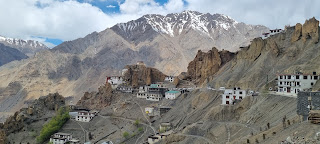 After some time, we spotted a hanging bridge over the river on the left hand side. We got down to the bridge and clicked pictures here against beautiful background. We spent about 20 min here. At 11.50 am, we passed by village Shichling.
After some time, we spotted a hanging bridge over the river on the left hand side. We got down to the bridge and clicked pictures here against beautiful background. We spent about 20 min here. At 11.50 am, we passed by village Shichling.
At 12.20 pm, we reached Dhankar monastry. Dhankar used to be the Seat of the King in ancient times. It was such a beautiful view of the monastry from a distance in the mountains as we were approaching the monastery. It looked as if entire monastery is hanging on a cliff edge, with snow clad mountains in the backdrop, and overlooks the confluence of the Spiti and Pin rivers. We parked the vehicle there and walked to the monastery. At one end, one could see the valley with river flowing across it on the ground. It was such a beautiful riot of colors all around us in nature. We clicked some really stunning pictures here.
We took lunch at a restaurant here, which had neat and clean washroom.
At 2.10 pm, we started from Dhankar monastry.
At 2.45 pm, we stopped at River spiti front. I dipped foot in the cold water of the river. It was so refreshing ! We spent about 15 min here, and then started again.
We stopped for 10 min at a man-made waterfall by the side of a bridge just before village Lingti. We then crossed village Lingti at 3.05 pm.
At 3.10 pm, we reached a point (small bridge) where one path on left going to Madh village (in Pin valley) and other (on right side) going to Kaza. We all were interested in visiting Madh village which is the last village in Pin valley (Pin valley is the least explored valley in
Spiti region of Himachal Pradesh. On the way to Madh village, we could also visit the Kungri Monastery and then the beautiful hamlet of Mudh - the last motorable village of the Pin Valley). So, we drove towards Madh but to our bad luck, the route was blocked due to stones. So, we reversed and drove towards Kaza.
At 4 pm, we reached petrol pump of Indian Oil at Kaza. A board put up there claimed it to be world’s highest retail outlet petrol pump at 12170 Ft.
At 4.15 pm, we reached Hotel Serkhang, Kaza (Mr. Amit 7876455275) nearby. Me and Amit got Room 206. At 4.30 pm, me and Amit walked to the Kaza market. We savoured Samosa and Jalebi here. We purchased 1 kg mango (safeda). Light drizzle started while on our way back to the hotel. At 5.45 pm, we returned to the Hotel. We enjoyed music in our room till 8.20 pm.
At 8.30 pm, we all assembled in the Dining room on the terrace and had Dinner. There, we played Antakshri from 9 to 9.30 pm. At 9.35 pm, we retired to our room.
(This area is known for Seabuck Thorn / Leh Berry but it was not available currently as it was not the season).
Day 6 : 9.6.2023 Friday : sightseeing in Kaza (Langza, Komic, Hikkim, Ki Monastry, Chicham bridge, kibber village)
We got up at 6.30 am and got ready leisurely. At 9 am, we all took breakfast in the dining room on the terrace.
At 9.35 am, we started from the Hotel (no luggage packing today, as we will stay tonight also at this hotel in Kaza). Pooja had some AMS issue and so we drove to a nearby medical centre of State Government where she consulted a doctor and got free medicines. At 10 am, we started from the hospital and took Kaza-Langza road. It was uphill journey…road was quite good.
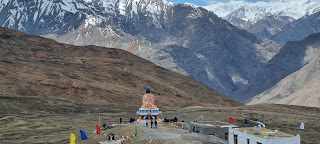
At 11.10 am, we reached Langza. It has a large Buddha statue at an altitude of 14300 ft overlooking the valley and mountains. As we reached there, it started snowing ! It was such a beautiful scene and feeling with light snowfall falling on everyone and we all clicking pictures around the statue.
At 11.55 am, we started from Langza, driving further up.

At 12.20 pm, we reached Komic monastery, at an altitude of 15500 ft. This is the highest point of the spiti trip. We were charged entry fee of Rs.30/- per passenger at the monastery. It was quite windy here. One can have a good view of Komik village from here. Komik is World’s Highest Village connected via motor-able road.

At 12.50 pm, we started from Komic monastry. It was down and down from here. I would like to point out that there are clean toilets at Langza and Komic, so there is no need to go in the open.
At 1.10 pm, we reached a point where there was a small tin shed which housed a counter selling printed post cards (of various attractions of Spiti valley) and postal stamps and envelopes and a shack selling maggi, omelette etc. There was a huge board put up here, with caption “ I ❤️ WORLD’S HIGHEST POST OFFICE”. We clicked pictures here. We purchased printed post cards and stamped envelopes here (Rs.40/- per card including Rs.6/- postal stamp). This place is called Hikkim.

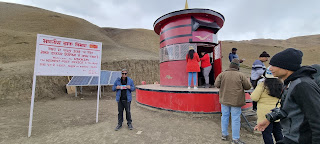
We then drove to a huge, red colored, Post box which was erected about 100 mtr away on the main route. This post box was actually an enclosure with postmaster sitting in it and receiving and sorting the post cards being posted by travellers here to their loved ones. So many travellers had gathered here including several bikers. All were elated to post to their loved ones from the World’s highest post office !
(The road down from Komic to Hikkim is not good. It is dusty, without black top. Snowfall continued off and on from Langza till Hikkim and even further).
At 1.55 pm, we started from Hikkim post office.

At 2.50 pm, we returned back to Kaza outskirt and from here, we took diversion to .... for Ki village and Key Monastry. (It is pronounced in many ways : Ki, Kee, Key etc.)
At 3.10 pm, we passed through Ki village (falls under Gram Panchayat Kibber). At 3.23 pm, we reached Kee Monastry. From a distance, it also looks like as if this monastery is hanging from a cliff edge. Such pictures of Dhankar monastery and Ki monastery are widespread on internet. The world famous Kee monastery is situated at a height of 13,668 feet. It is about 1000 years old.
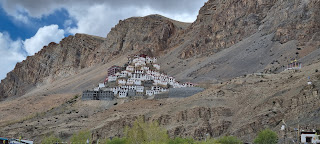
Here, at Kee monastry parking, we took lunch in a restaurant. We then visited the monastery which is a 5 minutes walk up. Amit told that he had come here few years ago and had met the person (in specks with a moustache, whose 2 daughters used to study in Delhi university back then) whose photo is now put up here as 19th Rinpoche (Rinpoche is a title in Tibetan Buddhism which may be given to a religious teacher known as a lama. The word "Rinpoche" literally means "precious one". Dalai lama is 14th Rinpoche). We were served local green tea here.
At 5 pm, we started from Kee monastery.

At 5.20 pm, we reached Chicham bridge. The Bridge is at a staggering height of 13596 ft. Look down and you will findyourself gaping below at a 100 ft deep gorge. It was very windy here, so windy that light weight people may be sept away by winds ! A slight drizzle also started with the heavy wind. At 5.35 pm, we started from Chicham bridge.

At 5.45 pm, we passed through Kibber village, taking pics sitting in the moving car. After crossing the village, we came across the green sign board of Kibber wildlife sanctuary.
At 6.35 pm, we returned back to our hotel at Kaza and relaxed in our room.
At 8.30 pm, we all assembled in the dinner room on the terrace and had dinner (after dinner, satsang with Amit and Munish in dinner room for one hour !).
At 10.15 pm, we retired to our room.
Day 7 : 10.6.2023 Saturday : Kaza to Chandratal
Today, we had to reach Chandratal camp in time so that after reaching there we could trek to Chandratal lake and click pictures before it became dark and overcast. So, we decided to start early today.
We got up at 5 am and got ready. At 7.10 am, we took breakfast (I took 1.5 egg, poha, bread butter). I also got packed a toast and butter and little poha.
At 8.25 am, we started from the Hotel at Kaza.
At 8.32 am, on the wooden bridge, we took diversion towards Losar (56 km away) (other route going towards Langza etc which we took yesterday).

We passed by village Rangrik at 8.39 am; village Kiato at 9.45 am, village Hansa at 9.50 am (Helipad here).
At 10.10 am, we reached Losar. We stayed for about 40 min here. Some relieved themselves here while some took food. This is NH-505. Losar is the last village / point before Kunzum and Chandratal. After this, its likely that we will not get any halt point or any eatery till Chandratal. It is also the last point till which the mobile network works. After this, the mobile network does not work. In Chandratal also, mobile network does not work. We will now find mobile network tomorrow at Gramphoo when we are going from Chandratal to Manali.
At 10.50 am, we started from Losar. Our driver got his documents checked at Losar checkpost.

At 12.10 pm, just after crossing a bridge, we reached Kunjam devi temple (Kunjam pass is away) by the side of the road and did darshan.
At 12.40 pm, we started.
The melted snow water was flowing on the kacha road at many places. At one point, one rock was obstructing the road. Some of us removed the same.
At 1.15 pm, we reached a diversion point - one route going to Manali and other to Chandratal. We drove towards Chandratal.

At 2 pm, we reached UC Camps, Chandratal (Mr. UC : 8219119543 / 9418401551). There were many camps put up at a vast tract of land here. From a distance and from height, it looked like a colony. The tents resembled the tents of king’s armies in old days (chhavni / lushkar) !
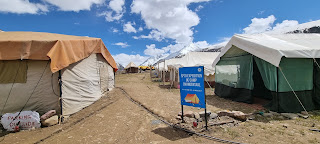

We were allotted tents. All tents had beds and attached toilet. We were also able to meet the owner i.e. UC Bhai, who was leaving for Kaza. It was quite cold here. Me and Amit took bread omelette and regained some energy.
Fortunately, the weather was very good – it was bright sunny day and route was also clear. So, our driver agreed to drop us till the last motorable point from where we will have to trek for only about 25 -30 min to reach Chandratal (otherwise, we would have had to trek for about 2 hours from our camp to Chandratal).
At 3.15 pm, we started in our Tempo Traveller from UC Camp. It was uphill drive on dusty uneven path. At 3.35 pm, driver dropped us at a point (parking point) from where we have to trek to Chandra taal.

At 3.55 pm, after walking / trekking, we reached Chandrataal lake. It is the origin of River Chandra which merge with river Bhaga at a place before Keylong, to become Chandrabhaga river.
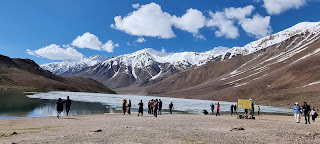

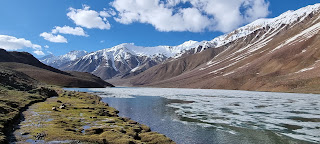

The mystical and beautiful Chandratal Lake, which translates to “Moon Lake”, is located at a height of 14,100 feet. The Chandra Bhaga mountain range forms a striking backdrop for the lake, which changes appearance according to the changing climate and time.
It was such a mesmerizing view at Chandratal. So many people, mainly youngsters, were rejoicing here. It was windy as well as very stinging sunlight here. It looked like a tourist spot with so many people !
At 6.08 pm, we started from Chandratal lake parking spot where our vehicle was parked.
At 6.30 pm, we returned back to UC Camps. It was becoming very cold. Me and Amit took Ginger Lime Honey and pakore and enjoyed Music on our Bluetooth speaker inside the dining tent. At 7.15 pm, soup was served by the camp staff. It was really very very cold outside. It must be zero degree temperature in the night !
At 8.45 pm, dinner was served in the Dinner area tent.
After dinner, at 9.15 pm, we hurried up to our tent N6. I was feeling very cold. The wind stopped around 9.30 pm (the camp staff told that generally the wind stops around 9 pm and start again in the day around 12-1 pm). Me and Amit retired to our bed.
At 3 am, I got up due to suffocation by diesel fumes of one Innova parked adjoining our tent. Its driver kept engine running to keep car heated inside in which he was sleeping. I made him switch off the engine. It gave some relief from suffocation. The sky was overcast. As a result, the Milky Way was not visible today (if sky is clear, one can see beautiful view of Milky way galaxy from here under the gaze of a million stars).
Day 8 :11.6.2023 Sunday : Chandratal to Manali to Delhi
I got up at 6 am and freshened up. We had no bath today as it was too cold, and moreover we had to leave early as it was a long journey today. We decided to leave early because as time passes, the water in the nallahs (water flowing down from the mountains on to the road) rises and there are so many such nallah throughout the route to Manali, making the journey risky and dangerous. As snow walls on both sides of road loosen with rising sun, the vehicles get stuck in snow on the road. We decided that here we will take just tea and will take proper breakfast at famous Chacha-Chachi dhaba at Batal which was about 1 ½ hour journey from here.
At 7.30 am, after taking tea and butter toast at camp, we started from UC camp Chandratal for Manali. The road condition was very bad. The road was very narrow. It was actually kacha raasta with water streams overflowing at many places on the path and vehicles coming from opposite direction blocking the narrow path at many places. This prolonged the journey to Manali.
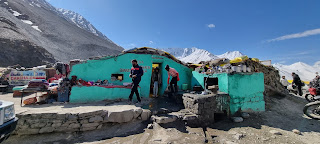
At 8.50 am, we reached Chacha Chachi dhaba at Batal. As this dhaba was overcrowded (thanks to wide popularity on youtube vlogs), me and Amit took breakfast at other dhaba nearby. At 9.35 am, we started from Chacha Chachi dhaba, Batal.
At 10.53 am, we crossed Chhota Dara village at an altitude of 3400 mtr.
From here, we leave Spiti district and enter Lahaul district.
At 12.20 pm, we crossed Chhatru.
After this, route is still kacha but is comparatively wide. Now, greenery slowly starts, leaving behind snow mountains and icy nalle and watery road. Now, road is dusty and greenery increases gradually.

At 1 pm, we reached Dorni nallah, where there was a glacier on the road turn and snow wall on both sides making a narrow gulli. The road was blocked here. One car got stuck in the road here.
At 1.27 pm, with great difficulty, cars stuck was moved and we steered out of nallah.
At 1.40 pm, the treeline started on left had side, with valley on the right had side.
At 1.45 pm, another nallah / durra came. One car was stuck here also. Fortunately, we were the first vehicle next to said car. As the said car managed to clear, we immediately crossed the nallah (but after that, we could see that other vehicles got stuck in the ensuing jam). We passed through this nallah in 5 min.
At 2.15 pm, after traversing Kaza-Manali road, we came on to the main highway (Manali-Rohtang highway), the left was going to Rohtang pass (about 15 min journey from here) and right was going towards Atal Tunnel. This place is called Gramphooand there was a Checkpost picket here.
At 2.27 pm, we reached Koksar.
At 2.50 pm, we stopped at Sunil Dhaba after crossing Koksar. Some took lunch here. Me and Amit took bhutte and gol gappe. At 3.30 pm, we started.

At 3.37 pm, we entered Atal Tunnel (North Portal), which is at an altitude of 10,040 ft. It is 9 km long. It is an engineering marvel. It was opened on 4th October 2020. Interestingly, unlike other mountain tunnels, it is a straight tunnel with no curves or bends !
After crossing the Atal Tunnel, we got down from the vehicle at the other end of tunnel and clicked pictures there. At 4 pm, we started from the Atal Tunnel.
There was heavy rush of vehicles, in a serpentine line on curvy mountain road, jostling to enter Manali. At 4.35 pm, we crossed Solang Ropeway and Ski Centre. It looked like a popular picnic spot locally. At 4.39 pm, we crossed village Solang. Sitting in vehicle, we could see people enjoying activities here like zipline etc.
At 5.45 pm, the Tempo Traveller dropped us at Manali volvo stand. The Volvo Bus No. 9798, which was to take us from Manali to Delhi, was parked on the roadside. We removed our luggage from the Tempo Traveller and put in the Volvo bus. It was raining. Driver did not allow us to board the bus. He said we can board only about 8.30 pm and at a point farther away ! He was rude.
To utilise time, me and Amit walked to Mall Road Manali (20 min walk) (4 co-travellers also went to Mall road in auto. Pooja left for some hotel. Munish and family took Zing volvo at 7 pm for Chandigarh). We two walked on the Mall road of Manali. Being Sunday, it was so crowded. We took pao bhaji and tikki at a restaurant, then dosa at another restaurant and then 8-in-one kulfi icecream ! We walked back to volvo pick up point. Other group members of our trip (including 10 passengers of other Traveller) were standing there. Waited for bus to come to that point. Driver brought bus at 8.45 pm.
At 9.30 pm, the volvo bus started from Manali. At 11 pm, the bus reached Aut where there was huge jam just before the Aut tunnel. It is 2.9 km long tunnel on Manali-Chandigarh National highway (about 60 km form Manali). This tunnel is a nightmare for the drivers. The traffic did not moved an inch for about 2 ½ hours ! The passengers of several vehicles came out and sat on the road and pavement – some played music, some relaxed.
At 1.30 am, the traffic jam cleared and the bus started.
At 2.25 am, our bus stopped at ‘Beas View Guest House’, at Pandoh, Mandi, for 30 min. for dinner. At 3 am, the bus started.
At 8 am, the driver stopped the bus at a shabby dhaba in Mohali. It had the worst toilets. Passengers complained to him but he was rude and adamant. Bus tipped here for 40 min (I took Afresh and herbalife shake). The bus was scheduled to drop us in Delhi at about 9 am but it got delayed (first due to late departure from Manali, then 2 ½ hours jam at Aut and to top it all, slow speed by driver). Two group members dropped at Mohali and two dropped at Zirakpur near Decthalone showroom. At 11.10 am, driver stopped bus at Mayur dhaba, Karnal. (I forgot my Herbalife shaker here). At 11.23 am, bus started.
At 1.20 pm, me, Amit and many passengers got down at Bypass in Delhi. I took an auto and reached home at 2 pm. (Rishu was about to leave for airport to go to Europe).
Thus, another good trip came to an end.
Note :
1. On Spiti Trip, one must keep in mind that one is bound to get tanning, as the suns intensity (due to Ultra Violate UV rays) is high on high altitude. So, is one is particular about skin color, one must use appropriate sun screen cream like SPF 50, which can lower the tanning, though not completely avoiding tanning.
2. Mobile connectivity and electricity is more or less available at every place in Spiti valley. The Jio mobile network works good in this region. There is no mobile network and electricity at Chandratal.






